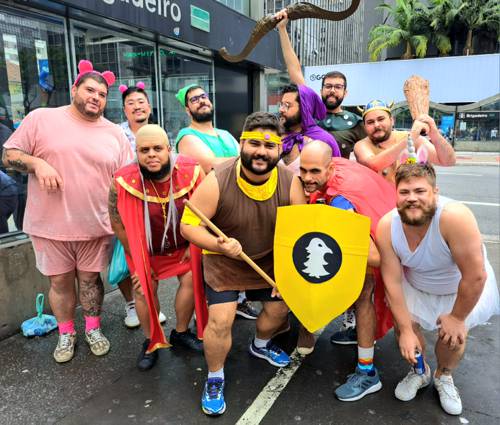
FAQ About The Influence of Brazilian Carnival on Global Festivals

What is Brazilian Carnival and why is it significant?
Brazilian Carnival is an annual festival celebrated primarily in Brazil as a period of festivity and celebration before Lent. It is significant because it showcases Brazil's rich cultural heritage, including music, dance, and costumes. The celebration is known for its vibrant parades, samba music, and elaborate costumes, attracting millions of visitors each year.

How does Brazilian Carnival influence other global festivals?
Brazilian Carnival has influenced global festivals by inspiring similar celebrations of culture, creativity, and freedom. Elements such as colorful parades, samba rhythms, and thematic costumes have found their way into festivals across the Caribbean, Europe, and North America, influencing events like the Trinidad Carnival and the Notting Hill Carnival in London.

What are the key elements of Brazilian Carnival?
The key elements of Brazilian Carnival include parades, samba music and dance, elaborate costumes, and street parties. These elements combine to create a dynamic and colorful atmosphere that celebrates Brazilian culture and history. Samba schools play a significant role, as they prepare year-round to showcase themed performances during the Carnival.

Why is diversity a central theme in Brazilian Carnival?
Diversity is central to Brazilian Carnival because the festival itself is a fusion of African, Indigenous, and European cultures. This blend is reflected in the music, dance, and artistic expressions that highlight Brazil's multicultural society. Carnival encourages expression and unity, celebrating different cultural identities and heritage.

What are samba schools, and what role do they play in Brazilian Carnival?
Samba schools are community organizations dedicated to performing during the Brazilian Carnival. They prepare elaborate parades with floats, costumes, and music based on a specific theme. Each school competes in the Carnival parades, judged on various criteria, including creativity, originality, and execution, making them integral to the festival's vibrancy.

How do Brazilian Carnival traditions spread across the world?
Brazilian Carnival traditions spread through globalization, media, and the Brazilian diaspora. As people move across borders, they bring cultural practices with them, while international media coverage of the Rio Carnival broadcasts Brazilian culture worldwide. This cultural exchange has led to the adaptation of Carnival elements in various local festivals around the globe.

What impact does Brazilian Carnival have on Brazil's economy?
The Brazilian Carnival significantly contributes to the economy, generating billions of dollars each year. It boosts tourism, creates jobs, and supports local businesses. The influx of visitors leads to increased spending on accommodations, food, entertainment, and crafts, thereby bolstering many sectors including hospitality and transportation.

Can non-Brazilians participate in the Brazilian Carnival?
Yes, non-Brazilians are welcome to participate in the Brazilian Carnival. Many tourists engage in the festivities, joining street parties and watching parades. Some even participate by joining samba school activities or workshops to learn samba dancing, experiencing the culture firsthand.

What are the major cities in Brazil that host Carnival celebrations?
Brazilian Carnival is celebrated nationwide, but the major cities known for their grand celebrations include Rio de Janeiro, Salvador, São Paulo, Recife, and Olinda. Rio de Janeiro hosts one of the world's most famous Carnival parades, while Salvador is known for its massive street parties and music from 'trio elétrico' trucks.

How has Brazilian Carnival evolved over time?
Brazilian Carnival has evolved from a traditional religious event to a major cultural festival. Initially influenced by European traditions, it gradually incorporated African and Indigenous elements, evolving into a celebration of Brazilian identity. Over the years, it has become more theatrical and commercialized, while still maintaining its core cultural significance.

What is the historical origin of the Brazilian Carnival?
The Brazilian Carnival traces its origins to European religious traditions, particularly the Catholic festival of Easter. Portuguese settlers brought the 'Entrudo,' a festival involving water fights, which over time merged with African and Indigenous cultural forms, ultimately leading to the modern-day Carnival celebrations characterized by samba music and parades.

In what ways does Brazilian Carnival promote freedom?
Brazilian Carnival promotes freedom by offering a space for self-expression and cultural celebration, allowing individuals to express themselves through music, dance, and costumes. It breaks down social barriers, unifying participants in a celebration where societal norms are often relaxed, embracing creativity and diversity.

Are there international festivals directly inspired by Brazilian Carnival?
Yes, many international festivals draw direct inspiration from Brazilian Carnival, including the Notting Hill Carnival in London, and the Toronto Carnival (Caribana) in Canada. These events incorporate elements like vibrant parades, music, and dance, emulating the celebratory spirit of Brazilian Carnival.

How do carnival parades operate during Brazilian Carnival?
Carnival parades during Brazilian Carnival are organized events where samba schools present their themed performances. These parades feature floats, dancers, musicians, and intricate costumes, taking place in arenas such as the Sambadrome in Rio de Janeiro. The schools compete for top honors, judged on various aspects of their performance such as artistic expression and adherence to the theme.

What is the role of music in Brazilian Carnival?
Music is a core element of Brazilian Carnival, primarily characterized by samba rhythms. It sets the festive mood and enhances the celebratory atmosphere. Samba music is performed live by bands and played through 'blocos' (street groups) and 'trio elétrico' (sound trucks). The infectious beat encourages dancing and unites participants in joyous celebration.

How does Brazilian Carnival influence fashion trends during the festival?
Brazilian Carnival has a significant influence on fashion trends, highlighting vibrant colors, sequins, feathers, and elaborate costumes. During the festival, participants and spectators alike embrace expressive and creative apparel. This influence often spills over into global fashion scenes, inspiring costume trends in other festivals around the world.

What are some common misconceptions about Brazilian Carnival?
Common misconceptions about Brazilian Carnival include the belief that it is just a party with no cultural significance. In reality, it is a rich cultural event with deep historical roots, showcasing a blend of traditions and art forms. Another misconception is that it only occurs in Rio de Janeiro, but it is celebrated throughout Brazil, with unique variations in different regions.

What safety measures are in place during Brazilian Carnival?
Safety measures during Brazilian Carnival include increased police presence, secure event infrastructures like the Sambadrome, and crowd control strategies in busy areas. Organizers work with local authorities to ensure participants' safety during parades and street parties, while tourists are advised to be mindful of their belongings due to pickpocketing risks.

How do locals participate in the Brazilian Carnival?
Locals participate in Brazilian Carnival by joining samba schools, attending street parties, and engaging in traditional events. Many participate in 'blocos' or informal street parades, while others might watch the official parades at the Sambadrome. For Brazilians, Carnival is an opportunity for communal celebration and cultural expression.

How do themes for the samba school performances during Carnival get chosen?
Themes for samba school performances are chosen through a collaborative process involving the school's members. Themes often reflect social, historical, and cultural topics, and extensive research goes into creating compelling narratives. Each performance is meticulously planned to tell a story through music, lyrics, and choreography, making the competition both educational and entertaining.
